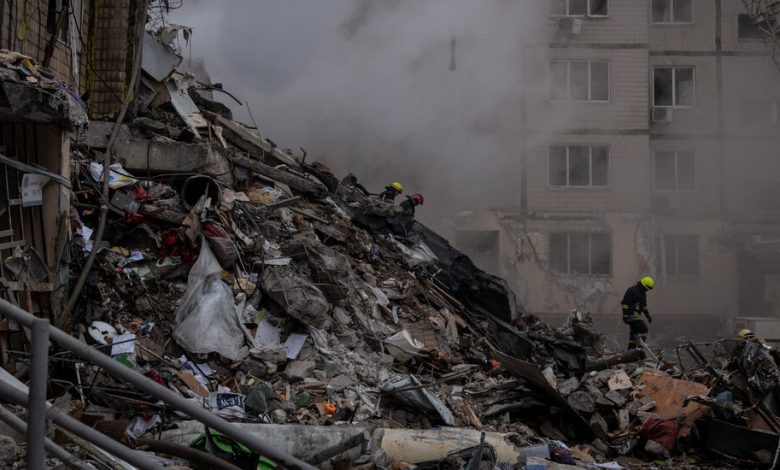Your Monday Briefing


The scene after a missile struck a residential building in Dnipro.Credit…Nicole Tung for The New York Times
A deadly strike on a Ukrainian apartment building
A missile built to sink ships exploded in the Ukrainian city of Dnipro on Saturday, hitting a nine-story apartment building. As of yesterday, 30 people were confirmed killed, 79 were injured and at least 30 people remained unaccounted for. It was one of the largest losses of civilian lives far from the front line since the beginning of the war.
A week before, Russia had launched dozens of missiles across Ukraine in two waves of strikes that coincided with the Orthodox New Year. Deliberately or recklessly attacking civilian populations in this way is widely considered a war crime. It comes after months of Russian assaults on infrastructure targets that provide power, heat and water.
Immediately after the attack, pro-Russian news outlets and military bloggers claimed that the apartment building was not the target but had been struck by fragments of the missile after Ukrainian air defenses tried to intercept it. Ukrainian forces were quick to deny that, and evidence from the scene pointed to a direct strike on the building.
Location: Dnipro, a city nestled against the river of the same name, had a population of just under one million before the war began. Although targeted by Russian shelling, the city has never been occupied by Russian forces or been the scene of frontline fighting. The city has been home to displaced people who have flocked to its relative safety.
In other news from the war:
-
Britain said that it would give battle tanks to Ukrainian forces, breaching a Western taboo against sending such powerful weapons.
-
Russia has looted Ukraine’s museums in what experts say is the biggest art heist since World War II.
World leaders gather in Davos
The World Economic Forum starts today in Davos, Switzerland. On the agenda: international fracture, nationalism and protectionism under the shadow of war in Europe and sharp tensions between the U.S. and China.
Politicians, executives, environmentalists and other leaders will wrestle with questions about the threat to supply chains, fears of nuclear “Armageddon” provoked by the war in Ukraine and the looming threat of a global recession. Power is shifting away from the U.S. as China’s military and economic heft grows, but the shape of an alternative international system is unclear.
Europe’s crises will be the undercurrent jolting discussions. Since Russia’s invasion of Ukraine last February, both the E.U. and NATO have remained mostly united. But there are continuing differences among member states, including over how to work with allies and NATO.
Details: China is sending a vice premier, Liu He, and the U.S. delegation will include Katherine Tai, the trade representative, and John Kerry, President Biden’s special envoy for climate. Volodymyr Zelensky, the Ukrainian president, has indicated that he will attend, although whether through video link or in person is unclear.
Israel’s new hard-right government
Three weeks in, Israel’s government, the most right-wing in the country’s history, is quickly pressing ahead with legislation that critics fear will erode Israeli democracy. Benjamin Netanyahu has returned as prime minister, this time leading a coalition of conservative, far-right and ultra-Orthodox parties.
Isabel Kershner, a correspondent in The Times’s Jerusalem bureau, spoke to The Morning newsletter about the right’s push to transform Israel. This is a lightly edited extract.
What is the new government trying to accomplish?
The right-wing parties in the coalition are all extremely ideological, and Netanyahu has made a lot of concessions to them. The new hard-right finance minister is claiming more authority over Jewish settlements and civilian affairs in the occupied West Bank. Ultra-Orthodox lawmakers want more autonomy and more funding for religious students and schools.
The government is also moving to radically overhaul the judiciary. The coalition wants to give Parliament more power to select judges and override Supreme Court rulings. Critics say the coalition’s proposed changes would completely change the nature of Israel’s liberal democracy, which is dynamic but also fragile.
What does the new government mean for relations with the Palestinians?
The levels of confidence are below zero. The previous Israeli government, which for the first time included a small Islamic Arab party in the governing coalition, prioritized fighting crime in conjunction with Arab local authorities. Now the minister overseeing the police has a history of being an anti-Arab activist and provocateur. The situation regarding the Palestinians in the occupied territories was already tense, and things have quickly become confrontational.
How has all this left Israelis feeling about the state of their politics?
There was a pro-L.G.B.T.Q. protest on the day the new government was sworn in because Netanyahu’s coalition includes some extremely anti-gay lawmakers. There have since been protests, including a big one on Saturday night, in Tel Aviv, a more secular, liberal city about an hour from Jerusalem.
Things here feel more polarized than ever, and there’s a lot at stake. The country is split over what kind of democracy Israel should be and how it’s going to relate to Palestinians. Even among the half of the country that did vote for a right-wing party, not all of them are happy.
THE LATEST NEWS
Around the World
-
A plane carrying 68 passengers and four crew members crashed in Nepal while trying to land yesterday. At least 68 people were killed.
-
China reported nearly 60,000 deaths linked to Covid in the month since the country lifted its strict pandemic restrictions.
-
President Biden wants Britain’s squabble with Europe over Northern Ireland trade settled before the 25th anniversary of the Good Friday Agreement. For Rishi Sunak, the British prime minister, that April deadline presents a difficult timetable.
-
An unusually warm winter in Switzerland has forced a rethink about climate change, as ski resorts and sports events face an uncertain future.
Other Big Stories
-
Amid tense negotiations between the Chinese company that owns TikTok and the Biden administration, several public universities in the U.S. have banned the app from campus Wi-Fi networks.
-
After a yearslong standoff, the police removed activists and razed the German village of Lützerath to make way for an open-pit coal mine.
-
Ecuador’s failure to curb some Amazon drilling shows how global financial forces drive biodiversity loss.
-
President Biden’s aides found more classified documents at his Delaware home than previously revealed.
From Opinion
-
Prince Harry’s memoir is about hunting and being hunted, Maureen Dowd writes.
-
Sexual violence remains a global scourge that we haven’t done enough to fight, Nicholas Kristof writes.
-
Martin Luther King Jr.’s last sermon shows a focus on the economics of racism that politicians often ignore, Esau McCaulley says.
-
The U.S. embassy in Jerusalem may be built on confiscated Palestinian land, Rashid Khalidi writes.
-
A deal to help South Africa transition to renewable energy is a breakthrough for the world, according to the Times editorial board.
A Morning Read
As the war in Ukraine rages on, thousands of Russians and Ukrainians have fled their homelands for the Indonesian island of Bali. But even in a tropical paradise, the war is ever-present.
“We don’t know how to communicate with Russians,” one Ukrainian worker in Bali said. “It is so hard for us.” Mostly, he added, he did not see the need to engage with Russians about the war. “They have their information and we have our own.”
SPORTS NEWS FROM THE ATHLETIC
Harry Kane closes in on record: Kane needs one goal to tie Jimmy Greaves as Tottenham Hotspur’s all-time top scorer. It’s a team achievement that doesn’t often happen anymore.
Manchester United looks like a contender: United’s derby performance shows there is an authority to Ten Hag’s instructions — which has put his team in the hunt for the title.
Karim Benzema taking his future ‘year by year’: Benzema says he isn’t plotting what’s ahead as he enters the final six months of his contract with Real Madrid.
From The Times: At The Australian Open, Nick Kyrgios, the eccentric and temperamental Australian showman, has withdrawn after a knee injury. Novak Djokovic, still unvaccinated against Covid-19, has been cleared to play. And Iga Swiatek, the No. 1-seeded favorite in the women’s bracket, faces a tough draw.
ARTS AND IDEAS
‘Based on a true story’
The entertainment genre of historical drama is flourishing — and riddled with inaccuracies, which range from embellishments to major fabrications. The untrue parts are leading to more public spats and lawsuits, Jeremy W. Peters and Nicole Sperling report.
Disclaimers like the ones featured in “The Crown” are sometimes enough to protect a studio from legal liability, especially if they are prominently displayed and offer detail of what has been fictionalized, legal experts say. But if someone can convincingly claim that he or she was harmed by what screenwriters made up, that is grounds for a strong defamation suit.
Defamation experts and Hollywood studios are closely watching developments in a lawsuit filed by a former prosecutor depicted in a Netflix series about the “Central Park Five” case. A federal judge ruled that her claims of defamation in five separate scenes in the series were plausible, and the case is proceeding in U.S. District Court.
Read more about the legal theatrics precipitated by historical dramas.
PLAY, WATCH, EAT
What to Cook
Green curry salmon is even better when you cook it in a pot with coconut rice.
What to Read
Our Books editors recommend “A Heart That Works,” a deeply moving and darkly funny memoir by the comedian Rob Delaney, and eight other new books.
What to Watch
The wrenching courtroom drama “Saint Omer,” in French, is based on a real-life case of infanticide.
Now Time to Play
Here’s today’s Mini Crossword, and a clue: Main prey for the world’s largest predator, the sperm whale (five letters).
And here are today’s Wordle and the Spelling Bee.
You can find all our puzzles here.
That’s it for today’s briefing. Thanks for joining me. — Natasha
P.S. Remy Tumin, who writes our U.S. Evening Briefing, is joining The Times’s breaking news team as a reporter.
Start your week with this narrated long read about abortion in the U.S. Friday’s edition of “The Daily” delves into classified documents held by both President Biden and Donald Trump after leaving office.
Reach Natasha and the team at [email protected].



